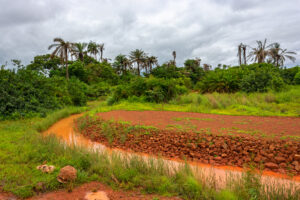Engineering students must demonstrate “an ability to apply engineering design to produce solutions that meet specified needs with consideration of public health, safety, and welfare, as well as global, cultural, social, environmental, and economic factors.” One global factor is responsible sourcing—the human-rights aspect of supply chains. Unfortunately, what’s good for the global environment may violate the human rights of vulnerable people. For example, let’s look at the supply chain ethics of electric vehicles.
The Dodd Frank Act of 2010 designates gold, tantalum, tin, and tungsten as “conflict minerals.” It requires companies listing on United States stock exchanges to check their supply chains for any of these minerals originating in the Democratic Republic of Congo or neighboring countries where some mines provide revenue for warlords. The intent of Dodd Frank is to stop fueling conflicts with this money. It does not prohibit companies from obtaining metals from Congo, even from conflict zones. However, the reporting encourages them to obtain the resources from mines outside conflict zones.
The downside of the green economy
There’s more to responsible sourcing than avoiding conflict minerals, though. The Responsible Minerals Initiative addresses other minerals essential to the green economy. The rise of solar– and wind power has increased the need for batteries because demand for power does not always coincide with the supply of sun or wind. Batteries are also essential for electric vehicles regardless of the source of electricity. Lithium and cobalt are both necessary for modern batteries, and both raise questions about the supply chain ethics of electric vehicles.
The breathtaking demand for EVs—which typically require six times the mineral input by weight of their fossil-fuel-burning counterparts just to make them go—is driving a new “gold rush” for an array of metals, including bauxite, nickel, lithium and manganese, needed to build and power them. But while EVs are widely considered essential for global efforts to tackle climate change, the costs and unintended consequences of securing these minerals have often been overlooked.—Washington Post, 27 April 2023.
Lithium
Most of the world’s lithium comes from Argentina, Bolivia, and Chile. Argentina has weak rule of law and widespread corruption. Indigenous peoples claim that lithium mining has reduced the availability and quality of water. In addition, there’s no formal process for negotiations between them and the mining companies.
In Bolivia, environmental damage from lithium mining has also resulted in conflicts with indigenous peoples. Weak rule of law and widespread corruption hamper Bolivia’s ability to resolve these problems, which will likely deteriorate as demand for lithium increases.
Even in Chile, with its strong rule of law and little corruption, lithium mining negatively affects flamingos. Five lakes in the Chilean Andes are home to three species of flamingo, two of which breed nowhere else. Climate change has shrunk these lakes, but the flamingo population is declining only near the lithium mines.
In these and other Latin American countries, governments seek state control of mineral resources to increase state revenues, create jobs, and protect vulnerable populations.
[A] sense of social justice is fuelling these politicians’ plans. Many hope that their policies will not only increase revenue, but reduce conflict. Since 2000 over a third of all conflicts related to extractive projects globally have taken place in South America… Mexico’s mining law would make companies give 5% of their revenues to the indigenous communities in which they mine. Mr Boric’s [Chile’s president] proposal would make companies use extraction techniques that require less water in order to minimise drought, which has been a source of anger among locals and indigenous groups.—The Economist, 2 May 2023.
However, resource nationalism has a poor track record in the region. The state oil companies of Mexico, Venezuela, and Brazil all offer cautionary tales. Chile’s experience with lithium is already showing similar tendencies.
Cobalt
Cobalt helps keep rechargeable lithium batteries from catching fire, as well as enabling them to store and transfer more energy. More than half the world’s cobalt comes from Congo. Congo’s history of conflict, government corruption, human rights violations, and poor environmental practices make it a dubious source for cobalt even though it’s not an official conflict mineral.
The environmental—and human—costs of bauxite mining

For electric vehicles to be practical, they need to be as light as possible. With its high strength-to-weight ratio, aluminum is an ideal material for car bodies. The world’s largest reserves of bauxite are in Guinea.
When mining companies arrived in Boké in northwest Guinea in 2016, villagers accepted offers of jobs and cash in exchange for farmland. As with the Navajo in the US, their extreme poverty left them little choice. Soon after, dynamite blasting, dust from trucks hauling bauxite, and heavy barge traffic destroyed their homes, crops, and fishing. The jobs never materialized, and the cash did not begin to compensate for lost homes and livelihoods. That is, extracting all that mineral wealth left them poorer than ever.
Lack of accountability
Guinea’s weak property laws failed to protect the interests of Boké’s residents. Instead, the mining companies determined how—or whether—to compensate them for their land without public input. No one held them accountable for the environmental damage.
Strip mining for bauxite is inherently disruptive. Industry experts acknowledge that loss of land, disturbance of wildlife habitats, and noise and dust are inevitable. They agree that mitigating the damage requires effective regulation, community involvement and aggressive oversight. So far, all have been sorely lacking in Guinea.—Washington Post, 27 April 2023.
Government corruption, which is rampant in Guinea, precludes oversight. The ore goes abroad for refining into alumina and subsequent smelting into aluminum. Car companies, which purchase the refined metal, don’t trace their supply chains back to the mines. Because responsible sourcing doesn’t reach all the way back to the origin, the Guineans are without recourse. More robust supply chain ethics for electric vehicles could give them better protection.
